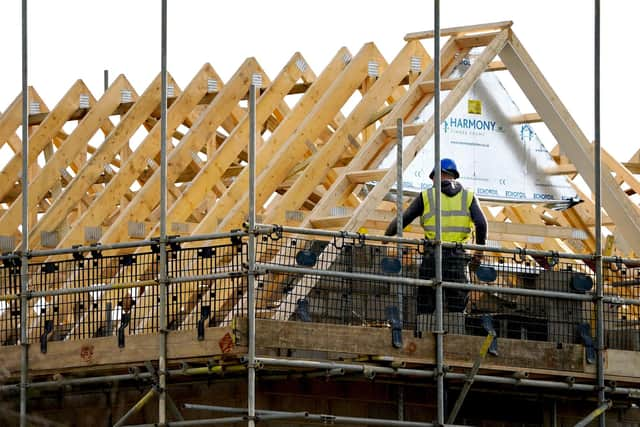Help for first-time home buyers is desperately needed, especially in rural areas - Sarah Todd
Put bluntly, today’s youngsters haven’t a hope of being able to buy their own home unless they have a high-earning job and, even then, they would need to join forces with a second person with a similarly substantial income to get that first foot on the housing ladder.
Of course, the so-called ‘bank of mum and dad’ is also a key factor in unlocking the door to their own home with deposits at amounts that must seem a challenge of Mount Everest proportions to gather up - especially for those shelling out rent at the same time as trying to save. As an aside, private rental costs in the UK have risen by 9.2 per cent in the last year.
Advertisement
Hide AdAdvertisement
Hide AdFigures from the Halifax at the beginning of the year, showed the typical amount needed for a deposit is around £53,414, representing around 19 per cent of the average purchase price. That gives a total layout amount 6.7 times the average UK salary of £43,257. Two things from this. Are there any young adults actually earning that amount? They certainly don’t here in a rural area, and secondly what a far cry it all is from their parents’ starting-out days of borrowing two and-a-half times a joint salary being enough to buy a house.


It’s all scary stuff with the BSA report quite rightly pointing out that home ownership among younger people has been in decline over the last 20 years.
Paul Broadhead, head of mortgage and housing policy at the BSA, explains: "Becoming a first-time buyer is possibly the most expensive it has been over at least the last 70 years, but a properly functioning housing market is dependent on first-time buyers being able to afford their first home.
"New thinking and radical changes are needed."
The Resolution Foundation think tank recently said that the most common living arrangement for an adult aged between 18 and 34 in 1997 was being in a couple with children, but now it is living with your parents. That’s a relevant timeline in this household, as it was the year this then young reporter got married. To be 24 years-old and buying a house seemed like a rite of passage, a natural next step; completely possible and certainly not a pipedream.
Advertisement
Hide AdAdvertisement
Hide AdOurs was a 17th century stone cottage - not quite chocolate box as taking the rose-tinted spectacles off the driveway was shared and it was near a busyish road - but fabulous old beams, two-bedrooms and a very decent sized garden. It would be around the £100,000 mark back then and interesting to think what our daughter, who will be 24 next birthday, would have to cough up to be able to buy what was then seen as a perfect starter home. Would it be nearly £300,000? Maybe more?
Here in the countryside, it feels like it’s impossible to name anybody who went to a local village primary school who has been able to buy a house in the area they grew up in. So many rural cottages - once the starter homes for generations of locals - are nowadays inhabited by the likes of prosperous retired couples or are raking in eye-watering incomes as holiday lets.
So, instead of flying the nest, most youngsters continue living with their parents. There are the odd ones, with well-paid jobs, who have managed to buy somewhere. But it will doubtless have involved a move away from their rural roots into a property offered via a first-time buyer scheme on a new-build development in town.
So, any children they have will grow up in towns; it’s a very real population shift. The indigenous population of the countryside has, quite literally, been priced out of their natural surroundings.
Advertisement
Hide AdAdvertisement
Hide AdThe Building Societies Association is right to say that whichever government is in power after the general election should commission a review of the first-time buyer market and use all its powers to help those wanting to buy their first home.
If only such a review would involve old-fashioned human beings knocking on doors with clipboards and talking to real people.
Too often online questionnaires are used to gauge opinion and there is no doubt that these always end up with a prosperous silver-surfer bias; the rest of the population being otherwise engaged trying to scrape a living.
It is hard to find time in our busy lives, but the core hard-working populations of any area - town, city or country - need to make their voices heard.
Comment Guidelines
National World encourages reader discussion on our stories. User feedback, insights and back-and-forth exchanges add a rich layer of context to reporting. Please review our Community Guidelines before commenting.